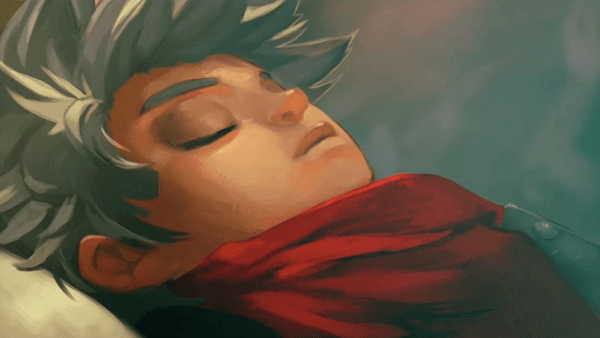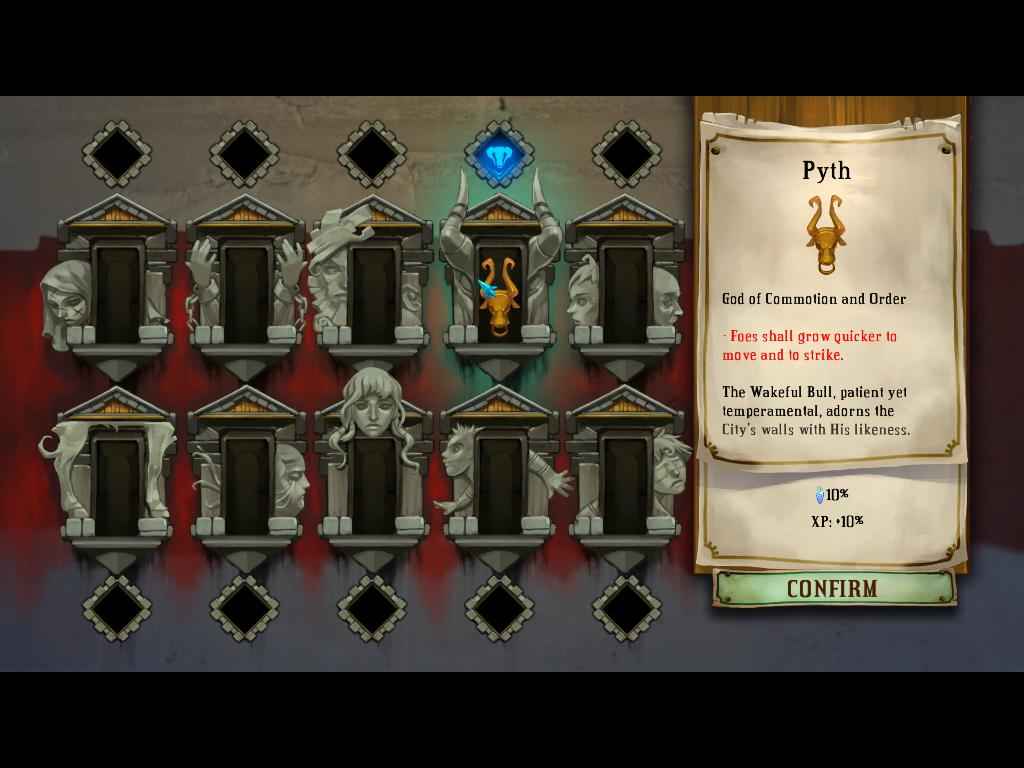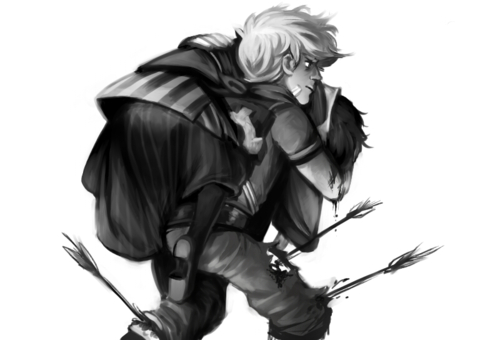Spoiler alert: Full Bastion disclosure to follow
It’s been a while since Supergiant Games’ indie smash Bastion insinuated itself onto the Xboxes of unassuming Summer of Arcade gamers everywhere, instantly capturing hearts and minds with its charming look and deep, emotionally charged narrative. Bastion has always been a game that benefits greatly from reflection, and as I’ve spent a large part of the past few months (no, really) doing just that, it has become more and more clear to me what exactly Bastion is.
Bastion is a videogame masterpiece.
I’m not just saying that Bastion is a fun game to play or that I recommend you buy it or anything like that – these are all, as far as I’m concerned, foregone conclusions and mere platitudes. The true marvel of Bastion is that underneath the gameplay mechanics rests a deep, enriching experience that truly pushes the envelope with what videogames are capable of.

Narrative
Bastion appears at first glance as though a story book. Its world is bright and colorful, though broken, and it hints at a certain whimsical charm that instantly draws you in. It seems almost natural, then, that there should be a narrator. The inclusion of the Narrator is Bastion’s most unique feature as well as one of its greatest triumphs. From a “gameplay” perspective (I’m not really fond of that word, I’ve decided), the Narrator is an elegant solution to the “game vs story” discord, as he can feed you pieces of story and background as you play. Sure, there are still a few cutscenes, but the bulk of the world is established through the dulcet tones of a man you ultimately come to know and trust.
The beauty of the Narrator extends far beyond simple storytelling conventions. Bastion is truly a story book in more than just appearance, and as the game progresses, it becomes clear that Rucks the Narrator is the central figure in this tale. As the only character in the game who actually talks, he speaks for all of Caelondia. Through Rucks we are witness to Caelondia’s collective guilt, and the regret brought on by the Calamity.
The Kid may be the character you play as, but Rucks’ honest and, at times, genuinely heartfelt account of what really happened makes it clear that this is his story. As a silent hero, The Kid is merely a vessel, a moving camera to take us on the journey of Caelondia’s sordid history, and through him we are witness to its tragic fall.
The most rewarding part about Bastion’s story is that it is never explicitly spelled out for you. The game hides bits of its narrative in every facet of the game. From the weapons you use to the challenges you complete to its soundtrack; each aspect of the game is heavy with a rich lore buried just below the surface, revealed to us piecemeal as we pla. It is said of the best graphic novels that they are neither “illustrated stories” nor “pictures with captions”, that they are more than the sum of their parts that only is truly expressed when the synergy that is “graphic novel” comes out; the same is true in spades of Bastion. While each of its constituent elements does a fair job at insinuating backstory, it is not until you experience them all together that the gravity of the game’s message is properly conveyed. Then, like the final tumbler of a lock clicking into place, the world of Bastion truly opens itself up.
Gods aint gonna help you son, you’ll be sorry for what you’ve done. Them gods gonna hurt you, son when you play with a loaded gun.

Theme
A large part of what makes a good story good is having something worthwhile to say. Bastion takes this to heart, as its narrative is not only expertly delivered, but also laden with great thematic significance. In its early acts, the game seems to be merely another story about post-apocalyptic survival in a pseudo-fantasy setting, yet as the nuances of the narrative reveal themselves, Bastion’s hidden statements begin to take wing.
Bastion is more than a simple game of survival and “fight the evil power.” It is a tale of hope and despair, the importance of friendship, longing, deep regret and, ultimately, acceptance and the ability to move on in the face of crippling truths. Yes, there are enemies to fight, but there is no great evil to face down, very little external conflict outside of just fighting enemies. The End of the World has already happened, and in its wake lies one of the hardest truths you could face – that in this world, the great evil is you. You are not fighting to save the world, you have already destroyed it. Your task is simply to come to terms with this reality, and make the choice to move forward (or not). It is a visually colorful and vibrant game whose moral dealings are very much done in shades of gray, and the impact this has stays with you long after you turn the game off.
I set my sail – fly, the wind, it will take me back to my home sweet home.
Tying it all Together
Many modern games sprinkle in only the the most transient shade of narrative required to hold the wad of mechanics and gameplay objectives together and make the whole thing make some kind of sense. Others approach the game strictly from the standpoint of story, implementing mechanics strictly to take us from one “chapter” to the next. In either case, we often see games whose story and game elements simply occupy the same space without actually supporting one another in any meaningful way. Not so with Bastion.
It is, as I mentioned previously, a story largely about hope and rebuilding. As you progress through the world, the once utterly destroyed landscape literally rebuilds itself beneath your feet, each step erasing the harm caused to the land and restoring its former beauty. As we play the game and complete more levels, our character collects more weapons and gets stronger. As The Kid traverses the many areas of Caelondia, his confidence and hope increase; he, as well as Caelondia itself, grow ever stronger with every step.
Once you have completed an area and recovered its core, you can’t ever return to it. This lack of backtracking may seem an odd choice for an RPG, but this too is in keeping with the game thematically. Bastion is a game about acceptance, about acknowledging the past but ultimately moving forward to build a new future. Just like the story it tells, Bastion is a game that is always moving forward to new, exciting possibilities.
The latter half of the story hinges on choice; choices that were made previously that brought you to your current situation, and choices you must make in their wake. Again, this theme of struggling with difficult choices is peppered liberally (though subtly) throughout the game. You must choose your weapons, your skills, your tonics, your upgrades – you are effectively overwhelmed by choice from the outset. What’s more, the further you progress in the game, the more items you unlock, the more choice you have and the more difficult the act of choosing becomes. When it comes time to make the final two decisions in the game (whether or not to rescue Zulf and what to do once you enter the Bastion’s Core), you are so weary of making choices that the weight behind these two monumental decisions is exhausting, even if you don’t realize it.

Bastion ends with a standard videogame dichotomy, but even this final “choose A or B” mechanic ties directly to the story’s message. You are told by Rucks that you can either activate the Bastion and reset the world to how it was before the Calamity – the catch being that there’s no guarantee that the whole mess won’t repeat itself. Alternatively, you can forgo the hard reset, and move forward with Rucks and Zia to face whatever awaits you, though it will almost assuredly be unknown and foreign.
This choice expresses itself very slyly through the game – after beating the game, you are given the option to restart the whole thing in a New Game+ – you’ll play through the entire game again, though you’ll have the benefit of your past knowledge and experience (in the form of all your weapons, upgrades, and experience). Of course, as gamers we know that we are destined to play through again; we know when we choose “New Game+” from the main menu that we have just perpetuated the cycle that brough about the Calamity in the first place.
Our desire to replay the game as a gamer is, in that way, expressing the inevitability of Caelondia’s fate. We know from the outset that a second playthrough has doomed Caelondia to relive the Calamity once more. Not only thematically in its end narrative, but also quite literally, the game gives you the option to return to the Way Things Were, in spite of the fact that you know for certain it will be difficult. Or, you can choose to not reset the Bastion’s Core. You can choose instead to look forward, not returning to the game – the future may be uncertain, but you will be guided by the experiences picked up along the way.
I dig my hole, you build a wall. One day that wall is gonna fall. So build that wall and build it strong, cuz we’ll be there before too long….
In Summation
As an action RPG,Bastion seems almost like a throwback to gaming of yesteryear, with its 2D sprite grahics and classically reminiscent gameplay. This only serves to highlight the fact that it does so much to progressively carry the medium forward. Not only is it narratively and thematically mature beyond what would typically be expected from a video game (let alone an arcade title), but it marries these elements so artfully with its gameplay. Playing Bastion and, subsequently reflecting on it, has given me new appreciation for what games made by passionate developers are capable of. More than just a “fun game” or a “good experience”, Bastion is a beacon of hope in the murky sea of AAA blockbusters and derivative genre titles. It is, in short, a masterpiece.
Originally posted on Pixels or Death